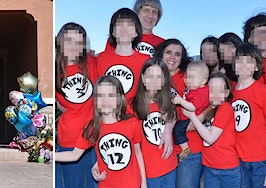An agent embroiled in the aftermath of the Turpin child-abuse case is facing public calls for the state of California to suspend or revoke her real estate license.
Vanessa Espinoza was a former deputy public guardian with a full-time assignment to help the seven oldest Turpin children navigate life after escaping their parents’ abusive home. She also worked part-time in real estate during this period, ABC News reports.

Vanessa Espinoza
Now, Espinoza is the subject of a new change.org petition that asks the California Department of Real Estate to investigate whether she did enough to meet the older Turpins’ needs as she juggled those responsibilities with her real estate career.
The petition surfaced after a recent “20/20” report from ABC News further detailed the conditions in which the 13 Turpin children were forced to live by their parents — including years of isolation, physical abuse and neglect, with limited access to food or clean clothes. The report also described their difficulty finding safe housing and other services in the years since they were rescued.
Espinoza was part of that broader effort to assist the Turpin siblings and help them achieve a sense of normalcy and security they never knew in their parents’ home.
But some of the adult children said that Espinoza was unwilling to answer even basic questions to help them adjust to life outside those doors, including how to use public transportation or cross the street safely.
“She would just tell me, ‘Just go Google it,'” Joshua Turpin, one of the family’s older siblings, told ABC News.
Espinoza did not immediately return a phone call from Inman requesting comment.
In its first three days, the online petition has garnered more than 1,300 signatures in support of stripping Espinoza of her real estate license, or at least suspending it.
“[Espinoza’s] lack of professionalism and dereliction of duties in her work with the Turpins and County of Riverside suggests unethical and dishonest traits that may hinder her responsibilities in real estate,” the petition reads.
The California Department of Real Estate did not immediately reply to an email from Inman asking whether Espinoza’s license was under review.
Prior to her time with the Turpins, Espinoza worked for the firm of Jack Osborn, the adult children’s court-appointed attorney.
She left Osborn’s firm for the role in the public guardian’s office, according to ABC News. This business relationship was disclosed to the court, Osborn told the news outlet.
Espinoza’s real estate work includes time with Century 21, according to her business Facebook page. It was unclear what brokerage, if any, she works with now.
Espinoza has not worked for the public guardian’s office since Aug. 21, a county spokeswoman told ABC News.
In its report, the news outlet said Espinoza did not reply to repeated requests for comment, and avoided their cameras on one occasion.
The children’s parents, David and Louise Turpin, pleaded guilty in 2019 on 14 felony counts and are serving life sentences in prison. The charges ranged from child cruelty to torture and false imprisonment.
Authorities became aware of the abuse in 2018 when Jordan Turpin, then 17, climbed out of a window and called 9-1-1 on a cell phone to report three of her siblings were being held in chains at home. Police arrived at the home to find the other children bruised, malnourished and unbathed. Seven of them were over the age of 18 at the time.
The children had been held out of school and experienced almost no contact with strangers or the outside world. Concepts like medicine were foreign to Jordan in her first conversation with police, which was captured on a department camera.
In the years since they were freed from the home, some of the Turpin children have struggled to find adequate housing and other services, ABC News reported.
“Did we see kids having to not have a safe place to live or stay at times? Yes. Did they have enough food at times? They did not,” Riverside County Director of Victim Services Melissa Donaldson told the news organization. “They had to go to churches and eat because they didn’t know how to manage money … and some without housing at times.”











